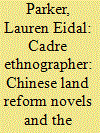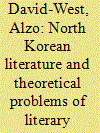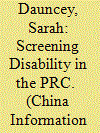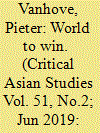|
|
|
Sort Order |
|
|
|
Items / Page
|
|
|
|
|
|
|
| Srl | Item |
| 1 |
ID:
183934


|
|
|
|
|
| Summary/Abstract |
Zhou Libo’s Baofeng zhouyu (Hurricane) and Ding Ling’s Taiyang zhao zai Sangganhe shang (The Sun Shines Over the Sanggan River), both written in 1948 and dual recipients of the Stalin Prize for Literature in 1951, were largely based on the authors’ own participation in the land reform movements of the Civil War. As socialist realist texts formulated through the ethnographic experiences of their authors – observation, fieldnotes, and first-hand accounts – these novels feature a geopoetics in which a new nation is constructed through the restructuring of its physical spaces. I analyze the land reform novels through their authors’ twin methods of knowledge production: an ethnographic approach to reconstructing the reality of land reform campaigns (the ethnographer) and the theoretical underpinnings of socialist realism as a narrative explication of the policy’s necessity (the cadre). The cadre ethnographer was an author who sought both to obtain knowledge and to effect a transformation of his object of study, a tension which in fact facilitated an embodied philosophy of history. As both inventor and chronicler, the cadre ethnographer reconciled the two halves of “socialist” “realism,” producing the method by which Maoist communism theorized its own historiographic authority as a narrative of socio-cultural transformation.
|
|
|
|
|
|
|
|
|
|
|
|
|
|
|
|
| 2 |
ID:
112388


|
|
|
|
|
| Publication |
2012.
|
| Summary/Abstract |
Tatiana Gabroussenko's Soldiers on the Cultural Front is the second book in English after 16 years to deal with North Korean literature. Written as a literary history with a strong focus on biography and policy, the study explains that Soviet Stalinist socialist realism was successfully implanted in North Korea from 1945 to 1960. Soldiers on the Cultural Front, however, neglects the 'theoretical problems of literary studies.' The consequence is that subjective value-judgments, extra-literary specialization determinism, and naive induction intrude upon the subject matter, reconfirming that North Korean literary studies in English is still not a well-developed or theoretically self-aware field.
|
|
|
|
|
|
|
|
|
|
|
|
|
|
|
|
| 3 |
ID:
079930


|
|
|
|
|
| Publication |
2007.
|
| Summary/Abstract |
This article outlines the political, social, economic, and cultural factors affecting disability representation in Chinese cinema from the founding of the PRC onwards, particularly after 1976. With reference to a wide variety of films that include main characters with visual, hearing, speech, physical, and learning impairments, it demonstrates how socialist realism, the equation of a "healthy" body with a healthy nation, and the great economic endeavor of the Mao era all contributed to the limitation of disabled people on the big screen, whilst the opening-up reforms, spiritual civilization campaigns, and commercial and critical demands of the post-Mao era effectively promoted their inclusion. At different times, the marginality of disabled people has resulted in them being overlooked as irrelevant, rejected as impaired, employed as a political tool, or identified as a marketable commodity. The representation or nonrepresentation of disability in Chinese film is closely linked to the politics of looking good
|
|
|
|
|
|
|
|
|
|
|
|
|
|
|
|
| 4 |
ID:
184736


|
|
|
|
|
| Summary/Abstract |
Since the 1951 establishment of the Syrian Writer’s Collective and the consequent consolidation of the doctrine of socialist realism, modern Syrian literature has been defining its own parameters as an autonomous entity that nonetheless is committed to social and political critique. After 1967, the inward turn of Syrian intellectuals resulted in a more militant equation of the literary field with doctrinal socialist realism. But there was a counternarrative in other cultural work such as that of the Syrian playwright Saʿdallah Wannous (1941–97) who in the 1960s began publishing short one-act plays inspired by Brechtian aesthetics of alienation. As a form, drama was less familiar to his audience and Wannous admits in Bayanat li Masrah ʿArabi Jadid (1988) that in this phase he was writing with no conception of an audience. This article examines Waanous’s aesthetic of alienation in relation to his manifestos and critical writings on the nahḍa or Arab renaissance of the late 19th, early 20th centuries. I then compare his dramatic aesthetic to contemporary Lebanese visual artist Rabih Mroué’s (b. 1967) work. I examine Mroué’s theatrical and video works in conjunction with his manifestos. Like Wannous, Mroué engages perpetrator and victim, drawing attention to the violence implicit in representation. In comparing both playwrights’ use of violence and relationships to previous articulations of realism, I focus on the reimagined position of the spectator and how it extends (not discontinues) earlier debates on committed art.
|
|
|
|
|
|
|
|
|
|
|
|
|
|
|
|
| 5 |
ID:
164678


|
|
|
|
|
| Summary/Abstract |
This article analyzes Chinese contributions to the Afro-Asian Writers’ Bureau’s efforts to reinvent World Literature from an anti-imperialist and anti-capitalist perspective. The Afro-Asian Writers’ Bureau was founded as a counter-narrative to Eurocentric conceptions of World Literature and universal culture. The AAWB’s vision was inspired by a Marxian understanding of worldliness. Relying on Chinese archival materials, this article shows how Chinese representatives to the AAWB, including Zhou Yang and Mao Dun, shifted from an explicitly Soviet, socialist-realist model for World Literature inspired by Maxim Gorky to a progressively independent, nationalist course in the wake of the Sino-Soviet split. The story of the AAWB is one of competing universal visions. The Chinese contributions to the AAWB are also reflected in China’s current expanding cultural influence and soft power in the Global South.
|
|
|
|
|
|
|
|
|
|
|
|
|
|
|
|
|
|
|
|
|